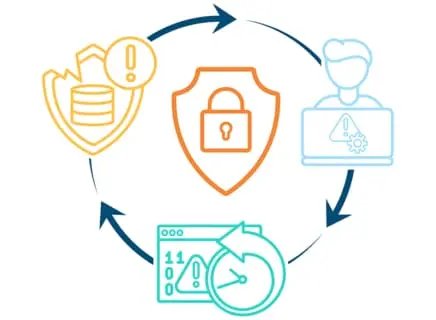
Introduction: Why Public Cloud resilience is under pressure in 2025
The public cloud is now the core infrastructure for most modern enterprises. Platforms like AWS, Microsoft Azure, Google Cloud Platform (GCP), and Alibaba Cloud host mission-critical applications, store sensitive data, and enable business agility. But with this dependency comes significant risk.
The threat landscape is expanding, from ransomware attacks to regional outages and human error. That’s why disaster recovery (DR) and cloud-native backup strategies have become vital components of cloud operations in 2025. However, they may fall short due to automation, cross-service orchestration, or regulatory needs, and companies are to rely on advanced third-party platforms like Hystax Acura for more complete protection.
The shared responsibility model: A risk many still overlook
Public cloud providers operate under a shared responsibility model. They guarantee infrastructure availability, but the customer’s responsibility remains data protection, backup, and recovery planning.
For example, AWS clearly states, “You are responsible for your content and applications that use AWS services.”
Organizations risk irreversible data loss, compliance violations, and costly downtime without a robust DR and backup plan.
Looking to simplify disaster recovery and cloud backups?
Leave your email, and our experts will show you how Hystax Acura ensures IT resilience across AWS, MS Azure, GCP, and Alibaba Cloud.
Thank you for your request!
We will be in touch soon.
We respect your privacy. See our Privacy Policy. You can unsubscribe at any time.

Top risks driving the need for Public Cloud backup and DR
Ransomware and cyberattacks
Cloud environments are high-value targets for ransomware. Without immutable backups and DR automation, recovery can take days or be impossible.
Human error
Misconfigured IAM roles or accidental deletions can instantly wipe out critical workloads. Rapid backup restoration is the only safeguard.
Cloud Service Failures
Despite the high availability of SLAs, entire regions of AWS and Azure have gone offline in recent years. Businesses without disaster recovery plans face extended outages.
Compliance and legal pressure
Regulations like GDPR, HIPAA, and local data sovereignty laws demand strict controls over data retention, access, and recovery times (RTO/RPO).
Core components of a public cloud DR and backup strategy
Cloud-native backup
Utilize services that integrate with your provider’s APIs for automatic, incremental, and encrypted backups of VMs, block storage, databases, and configurations.
Disaster recovery orchestration
Implement automated DR runbooks to manage failover and failback processes. Define dependencies, prioritize workloads, and schedule DR testing without impacting production.
Data replication
Intra-cloud replication (within availability zones or regions) is key to high availability. Real-time replication minimizes data loss in case of an incident.
Immutable storage
Ensure that backup data is immutable and air-gapped—i.e., it cannot be altered or deleted, even by administrators. This option is essential for ransomware defense.
Monitoring and alerts
Use tools that monitor backup success, detect anomalies, and trigger alerts for failed jobs or policy violations.
Effective backup and disaster recovery solutions help organizations meet business continuity goals while optimizing storage costs and minimizing downtime. These IT disaster recovery procedures are central to protecting mission-critical services.
Platform-specific disaster recovery and backup approaches
Amazon Web Services (AWS)
Native tools: AWS Backup, EBS snapshots, RDS automated backups
Best practices:
- Use Amazon S3 Backup with Object Lock for immutable storage
- Replicate snapshots across Availability Zones (AZs) and optionally regions
- Integrate backup policies with AWS Organizations for centralized control
Amazon cloud backup options provide one of the best disaster recovery solutions for public cloud workloads, providing scale, automation, and compliance-ready protection.
AWS Cloud Backup and Disaster Recovery with Hystax Acura →
Microsoft Azure
Native tools: Azure Backup, Azure Site Recovery (ASR) for VM replication
Best practices:
- Leverage Recovery Services Vault for centralized backup
- Enable Geo-redundant storage (GRS) for region-level resilience
- Automate backup for Azure SQL, Files, and Blob Storage with built-in policies
Microsoft offers a mature Azure backup and disaster recovery ecosystem, supporting VM replication, file backups, and full-stack protection. Following Azure disaster recovery best practices—like redundancy, encryption, and automated failover—is essential to a resilient Azure DR solution. Policy-driven orchestration offers scalable and secure service restoration for enterprises that rely on Microsoft Azure disaster recovery.
Google Cloud Platform (GCP)
Native tools: Persistent Disk snapshots, Cloud Storage backup, Cloud SQL automated backups
Best practices:
- Use Coldline or Archive storage tiers for cost-effective retention
- Employ snapshot schedules and retention policies for compliance
- Monitor backup jobs with Cloud Monitoring and Logging
GCP backup solutions provide multiple layers of protection for storage, compute, and databases, making it a strong choice for businesses seeking the best cloud backup strategies.
Alibaba Cloud
Native tools: Hybrid Backup Recovery (HBR), ECS snapshot services, ApsaraDB backups
Best practices:
- Schedule ECS instance backups across regions for failover readiness
- Enable encryption and integrity verification
- Use Alibaba’s backup vault with long-term retention options
With its growing presence in Asia and emerging markets, Alibaba Cloud provides a solid foundation for disaster recovery and long-term data retention, especially for organizations navigating regional data regulations and hybrid cloud architectures.

Best practices for public cloud DR and backup
Align DR plans with business objectives
Classify workloads by criticality and define RTO/RPO targets that support Business Continuity.
Test regularly without disrupting production
Use non-disruptive testing capabilities to verify DR readiness. Document and optimize processes continuously.
Secure backup data at rest and in transit
Enforce encryption, use IAM policies, and audit access logs to ensure data protection.
Don’t rely solely on native tools
Cloud-native tools are valuable but often lack cross-service orchestration, analytics, or immutability. Consider complementary third-party backup and disaster recovery solutions like Hystax Acura that address these gaps.
A comprehensive DR planning process includes workload classification, dependency mapping, and clearly defined disaster recovery solutions aligned with business SLAs. Testing these plans ensures readiness and reveals gaps in your IT disaster recovery strategy.
Ensure your cloud workloads are secure, resilient, and recoverable
Request a free personalized demo of Hystax Acura — a solution designed for seamless, automated disaster recovery and backup for public clouds.
Thank you for your request!
We will be in touch soon.
We respect your privacy. See our Privacy Policy. You can unsubscribe at any time.
Conclusion: IT Resilience is a business imperative
In 2025, disaster recovery and backup for public clouds are no longer optional—they are a strategic foundation for business continuity. With more enterprises running mission-critical workloads in AWS, Azure, GCP, and Alibaba Cloud, any disruption caused by a cyberattack, misconfiguration, or regional outage can have a lasting financial and reputational impact.
With the rise of cloud computing and disaster recovery demands, businesses need more than essential tools. They need intelligent, policy-driven, automated platforms that ensure compliance, continuity, and confidence.
Companies must adopt solutions that back up data and guarantee rapid, automated recovery with minimal downtime. That’s where Hystax Acura comes in.
Hystax Acura offers a comprehensive, fully automated disaster recovery and backup platform tailored to public and private cloud environments. It enables:
- Agentless backup and replication for cloud-native and lift-and-shift workloads
- Fully automated, policy-driven DR plans on replicated infrastructure with best-in-class RTOs and RPOs
- Incremental snapshots with deduplication and compression
- Immutable storage to defend against ransomware
- Seamless recovery orchestration for testing, failover, and fallback
Unlike native tools, which often require manual configuration and lack cross-service orchestration, Hystax Acura provides a centralized, user-friendly interface for managing DR and backup across cloud accounts and services.
With Hystax Acura, organizations ensure data integrity, compliance readiness, and fast operational recovery while reducing the cost and complexity of managing backup infrastructure.
How to enhance IT Resilience and Business Continuity with fully automated and reliable Hystax Acura software →
